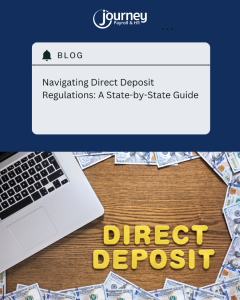Navigating Direct Deposit Regulations: A State-by-State Guide

Direct deposit is a widely used method for payroll distribution, offering convenience and efficiency for both employers and employees. However, if an employer is looking to require direct deposit and move away from paper checks, the state regulations surrounding mandatory direct deposit can vary significantly. In this blog post, we will explore the current landscape of direct deposit laws, the pros and cons of mandating direct deposit, and recent trends in payroll regulations.
What is Direct Deposit?
Direct deposit is an electronic payment method where funds are transferred directly from the employer’s bank account to the employee’s bank account. This method eliminates the need for physical checks, providing immediate access to funds and reducing the risk of lost or stolen checks.
Federal Regulations
Many states have their own laws surrounding direct deposit, some defer to federal regulations if they choose to not enact laws that supersede federal law. At the federal level, the Electronic Funds Transfer Act (EFT) and Regulation E outline the protocols for electronic payments, including direct deposit. Employers can require direct deposit as long as employees have the right to choose the financial institution where their wages will be deposited. Please review the details here.
State Regulations on Mandatory direct deposit
The regulation of mandatory direct deposit varies across different states. Here’s a breakdown of how various states handle this issue:
Alabama……Follows federal regulations
Alaska………Requires employee consent
Arizona……..Requires employee consent
Arkansas……Requires employee consent
California…..Must offer alternative payment methods
Colorado……Requires employee consent
Conn.………..Requires employee consent
Delaware……Requires employee consent
Florida……….Requires employee consent
Georgia………Requires employee consent
Hawaii………..Requires employee consent
Idaho………….Requires employee consent
Illinois………..Must offer alternative payment methods
Indiana……….Allowed with conditions
Iowa………..Allowed with conditions
Kansas…….Requires employee consent
Kentucky….Allowed with conditions
Louisiana….Follows federal regulations
Maine……….Allowed with conditions
Maryland…..Requires employee consent
Mass…………Follows federal regulations
Michigan……Allowed with conditions
Minnesota….Requires employee consent
Mississippi…Follows federal regulations
Missouri…….Follows federal regulations
Montana……Requires employee consent
Nebraska……Follows federal regulations
Nevada………Requires employee consent
New Hampshire..Requires employee consent
New Jersey….Requires employee consent
New Mexico…Requires employee consent
New York……..Requires written employee consent
N Carolina…..Allowed with conditions
N Dakota…….Allowed with conditions
Ohio…………….Follows federal regulations
Oklahoma…….Allowed with conditions
Oregon…………Requires employee consent
Pennsylvania….Requires employee consent
Rhode Island….Requires employee consent
S Carolina…….Requires employee consent
S Dakota……Allowed with conditions
Tennessee…..Requires employee consent
Texas………….Requires employee consent
Utah…………..Allowed with conditions
Vermont……..Requires employee consent
Virginia……….Requires employee consent
Washington….Allowed with conditions
West Virginia…Allowed with conditions
Wisconsin…….Allowed with conditions
Wyoming………Requires employee consent
Pros and Cons of Mandatory Direct Deposit
Pros:
- Convenience and Efficiency: Streamlines payroll processes and provides immediate access to funds.
- Cost Savings: Reduces expenses related to printing and distributing paper checks.
- Security: Minimizes the risk of lost or stolen checks.
- Environmental Benefits: Reduces paper usage and waste.
Cons:
- Access to Banking Services: Not all employees have access to bank accounts.
a). IMPORTANT! Journey Payroll & HR clients can offer employees who don’t have a bank account a paycard. This is a great option for employees who cannot get a standard bank account.
- Employee Preferences: While direct deposit has become the norm in 2025, some employees may still prefer paper checks.
Conclusion
Although there haven’t been significant recent changes to direct deposit regulations at the federal level, we will keep you updated as any new regulations roll out. If you have any questions, Journey Payroll & HR is here to help!